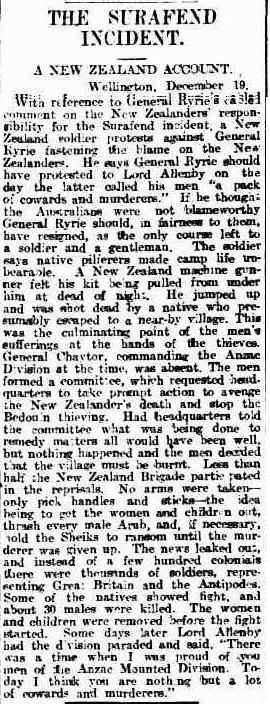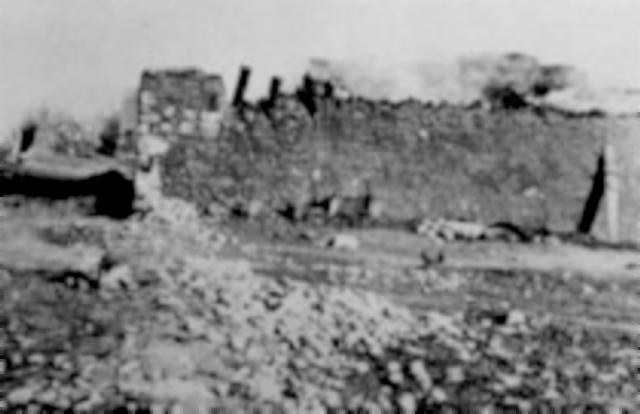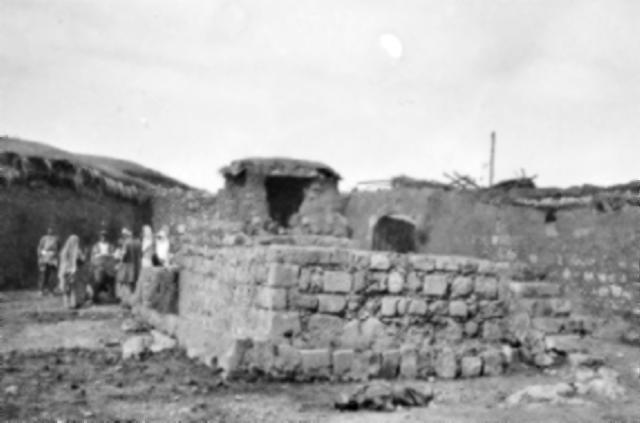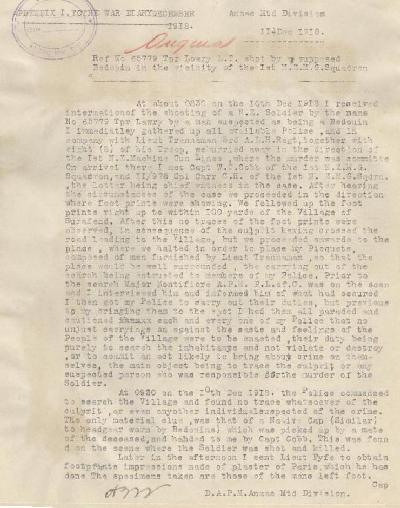Topic: BatzP - Surafend
Surafend, the massacre
Palestine, 10 December 1918
Ted Andrews Account
The following account of Surafend was put together by Ted Andrews from various sources, although the chief source being an anonymous diarist known by the nom de plume of "Kiwi Trooper". The commentary on Surafend appears in his book "Kiwi Trooper" The story of Queen Alexandra's Own, published in Wellington, 1967. This extract is from pp. 187 – 191.
Surafend Affair
The murder was promptly reported through the normal chain of command in the Anzac Mounted Division, and to the higher authorities but, for some reason, never explained, nothing was done. The immediate arrest of the murderer before he could escape further afield was hoped for, but lack of action next day worked up the feelings of the Anzac and U.K, troops in the vicinity to fighting pitch.
The troops had suffered casualties throughout the Sinai and Palestine campaigns by treachery of the Arabs, who were seldom, if ever, punished. All stores had to be guarded against looting, sentries were murdered, the dead at Rafa were dug up and stripped of their clothes while the treacherous ambush of Ain Sir was still fresh in the minds of the New Zealand troops. Also, not long previously, an Australian military policeman had been murdered in the vicinity, but no official action had been taken. Tpr. Lowry's murder was the last straw. A trooper states:
"After dark, at 7 p.m, that evening (10th December), a meeting, representative of all units in the area, was held in a gully in the sandhills. It was addressed by an A.L.H, trooper, a small dark chap, an orator and organiser of no mean ability. He called a roll of units, then outlined the plan. Two hundred (of all units) armed with pick handles and waddies were to quietly surround the village within the hour. The head man was to be called upon to deliver up the murderer. If he did not, then all inhabitants would be extracted, women and children let loose and all men soundly thrashed. This duly began but, in the event, the men resisted fiercely with a variety of weapons and a general melee ensued in which 40 were killed and the village fired."
The "History of the W.M.R." says:
"A party of some 200 men demanded the production of the murderer. No satisfactory reply being forthcoming, the old men, women and children were taken to a place of safety, whilst the able-bodied men were dealt with and the village burned.
"At a Court of Enquiry on the incident, held subsequently, no evidence was available to attach the blame to any particular persons or regiment, such had been the secrecy with which the plans had been prepared. The Arabs gave no further trouble."
Just what the words "dealt with" mean is not stated in the above, but it was said that for years after, the young women of the Surafend district wore a most dissatisfied look, while, in choral circles, Surafend was famed for its male sopranos!
An immediate sequel to the raid was that next day, a deputation under a white flag came in from a neighbouring village forcibly escorting the murderer of the Australian M.P!: "Kiwi Trooper's" account reads:
"Our 2nd Sqn. "Q.A.O," lines ran east-west, with the M.G. Sqn. lines at right angles, running south towards the village, being the nearest to it. We knew nothing of the projected raid until less than one hour before it started. Five of us from No. 1 Troop went out to buy(?) oranges from a nearby grove and returned with a chaff-sack each which, strangely, cost us not a single piastre! Then some Scottish troops, in twos and threes, were going through our lines towards Surafend. I asked them where they were going:
“To the wee dustup the noo, doon in yon village,” they replied.
"Our much respected troop leader, Lieut. Bob Sutherland, told us to keep well out of it, which we did. We saw the flames go up shortly after. Surafend, or its ruins, were placed out of bounds later - it smouldered for days.
"The following Monday, 16th December, the whole Anzac Mounted Division was paraded on foot and formed in a hollow square just west of our squadron lines, under Maj-Gen. Chaytor. General Allenby, with his aide and standard bearer, rode into the square and, in a furious outburst of anger, addressed the parade:
"There was a time when I was proud of you men of the Anzac Mounted Division. Today I think you are nothing but a lot of cowards and murderers.'
"There was a slowly swelling murmur from the troops and then the count began: 'One-two-three, etc.' General Chaytor sensed the feeling of the men and told Allenby he would soon be unable to hold his troops. Without answering Chaytor's salute, Allenby wheeled his horse and galloped off to the strain of “Eight-Nine-OUT!!! We Anzacs were not men to be sat on!"
There were further repercussions of the "Surafend Affair." In his account of the last victorious campaign, General Allenby omitted all mention of the gallant part played by the Anzac Mounted Division and also blocked their final list of recommendations for decorations. He steadfastly refused to make amends or forgive their reprisal act on the village, but later relented enough to pass a supplementary honours list. Nor did the Anzacs forgive him. The incident was included in that excellent book, "Armageddon, 191.8" by Capt. Cyril Falls, published 46 years later (1964), in which he stated:
"Both sides had been in the wrong, but the (Anzac) troops more so than the Commander-in-Chief." This statement led to a furious outburst in the Press throughout New Zealand.
Many letters were written to the papers by men who were there at the time, and whose opinion of the Arabs, and Allenby for defending them, was low, to say the least.
In fairness to Maj-Gen. Sir Edmund Chaytor, it must here be recorded that he was away on leave when the murder and reprisal took place, the Division being temporarily commanded by Brig-General Granville de Ryrie, of the Australian Light Horse.
There was a brighter side to the "Surafend Affair." It was put to verse by one of the troopers who took part in it. Here it is, per courtesy of the N.Z.R.S.A. "Review," from their August, 1939, issue.Sir General Edmund Allenby
A proclamation sent,
To all his troops in Egypt
That wheresoe'er they went;
The Gippo was protected
The dirty thieving crew,
And if this law was broken
A penalty was due.
This law like soldiers we obeyed
Right throughout the piece,
Then cannons stopped their shelling
The world wide war did cease;
We left new scenes of battle
And travelled back to old,
There fought was Edmund's knighthood
And lives were dearly sold.
A restcamp was erected
Near Richon's sunny green
Close by that now ill-fated spot
Where then stood Sura Feen;
Here Bedui lived as farmers
An honest game tis true,
But through the hours of darkness
They prowled the restcamp through.
One moonless night it came to pass
(A night when robbers shine)
A Bedouin came prowling down
The 1st Machine Gun line;
With stealthy step and wily glance
Up to a tent he crept,
And there he spied a kitbag
Near where a gunner slept.
The bag was moved the lad awoke
And saw the Bedouin's face,
The coward fled-the lad arose
And straight away did give chase;
They ran a hundred yards or more
The trooper gaining fast,
A shot rang out-the soldier fell
For he had run his last.
The Heads were asked to take a part
To find the murdering cur,
But though they knew 'twas urgent
They didn't seem to stir;
The troops allowed them ample time
Then called a general meeting,
At 7 p.m. that very night
As time so fast was fleeting;
And there decided on a raid
That 'ere the day should end,
An honest life would be revenged
That was a soldier friend.
T'was a never-to-be-forgotten night,
The village was soon in flames,
The wallads knocked when sighted
But protected were the dames;
Although we are fighting Anzacs,
Our honour we uphold,
And treat the women fairly
As did our ancestors of old.
As morning dawned we stood and watched,
That devastated scene,
Where but a single yesterday
Had flourished Sura Feen;
We turned away in silence
But feeling justified,
That for our murdered comrade
We would have gladly died.
A week passed by in silence
Then we were ordered to parade,
Before Sir Edmund Allenby
We knew 'twas about the raid;
They formed us up in squadrons
On a bright December day,
And Chaytor prayed for silence
While Edmund had his say.
He galloped up towards us
With his staff in tabs of red,
And in the square still mounted
These very words he said;
"Cowards, cold-blooded murderers
"Barbarians by the score,
"I was proud of you at one time
"I am proud of you no more."
As soon as he was finished
The Anzacs laughed aloud
But Edmund turned without farewell
And galloped from that crowd.
TO RAFA
From the diary of "Kiwi Trooper":
"We left Richon-le-Zion and the ruins of Surafend on Wednesday, 18th December, 1918, and trekked down the coast to Rafa in easy stages, about ten miles a day, arriving there on 23rd December. It was said, with good reason I understand, that the Aussies had planned to raid the wine cellars (believed to be the largest in the world) at Richon and Sarona at Christmas! The Heads had got wind of it - they were rather jumpy after the Surafend Affair - and, being in a Biblical land, rightly decided to remove us from temptation and deliver us from evil.
Further Reading:
Battles where Australians fought, 1899-1920
Citation: Surafend, the massacre, Palestine, 10 December 1918, Ted Andrews Account







